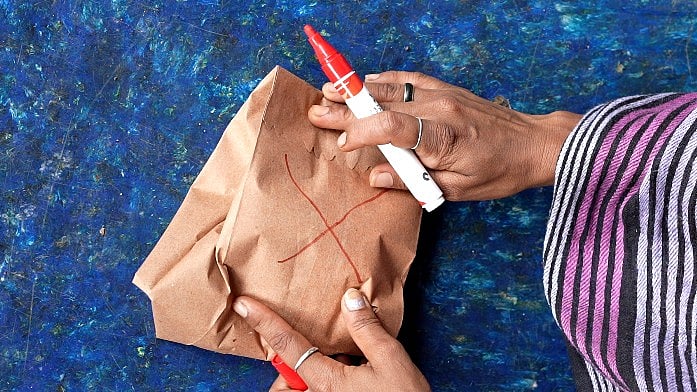
The #MarkItRed campaign calls on citizens to wrap sanitary or hazardous waste in paper and mark it with a red cross for safe disposal.
Credit: DH photo
Bengaluru: The city discards nearly nine lakh sanitary pads every day, most of which end up mixed with dry waste.
This exposes over 22,500 informal wastepickers to infection, indignity, and the loss of recyclable material.
The problem began with a 2016 campaign urging citizens not to mix sanitary pads, diapers, and medical waste with wet waste. However, segregation remains poor, with many areas still dumping unsegregated waste in blackspots, often because collectors refuse to accept it.
"How are we supposed to work? We do not have any gear and must segregate it with our bare hands. The waste reeks, carries maggots and even human excreta," said Navneeth K, a waste collector from RR Nagar.
In Agra Lake area, collection supervisor Raju said his team strives to keep waste segregated, but many citizens continue to mix hazardous items.
"All we ask is that people discard broken glassware, needles, diapers, sanitary pads and tampons in separate paper bags and mark them red, so we know they are hazardous," he said. His team, equipped with gloves and masks, still faces challenges as mixed waste leads to recyclables being lost.
Kumuda, an operator from JP Nagar (Ward 177), recalled being pricked by a used needle earlier this year. "My hand got infected, and I needed three months of treatment to recover," she said.
She explained that residents often wrap hazardous waste in small newspaper pieces or plastic bags, which tear and emit foul odours. "If people use paper bags and keep such waste separate from wet and dry waste, it will help immensely," she said.
Nalini Shekar, an activist with Hasiru Dala, said citizens often evade responsibility. "Many say segregation is pointless because it gets mixed later. But that does not matter. Change starts with one person," she said.
To address this, @Invaluables.Bengaluru Initiative, under Saamuhika Shakti collective, have launched the #MarkItRed campaign, anchored by comedian and social media creator Shraddha Jain (Aiyyo Shraddha). The campaign urges citizens to wrap sanitary and hazardous waste in paper and mark it with a red cross, ensuring safer and more respectful disposal.
The campaign video went viral with over 1.3 million views, sparking discussions and awareness on wastepickers’ safety.
The success builds on earlier efforts such as #WashTheDabba, a campaign urging Bengalureans to wash disposable food containers before discarding them. It turned into a city-wide movement, with 60% of those exposed report adoption of the practice, resulting in cleaner food boxes received at city’s dry waste collection center.